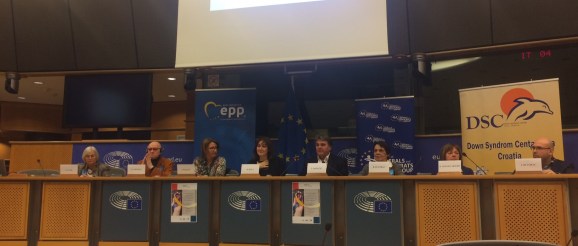European Parliament hosts conference on Down Syndrome

January 24th EHMA attended a mini-conference in the European Parliament on learning disabilities. The conference brought together academic and service experts dealing with the topic of Down Syndrome (DS). Central to the conference were the practices developed by the Down Syndrome Centre in the city of Pula, Croatia. The Centre was recently recognised by the WHO as a model of excellence, to serve as an example for replication throughout the EU. The headmaster of the centre, Dr. Branka Butorac, was extensively lauded for setting up the first non-governmental institution for the rehabilitation of people with DS in Croatia, and for her efforts to break down some stigmas of DS. Being the mother of a daughter with DS, Dr. Butorac designed the rehabilitation processes in the Down Syndrome Centre Pula to reflect real needs of persons with DS and their families. Key principles of the facility are a high involvement of all family members, and a programme geared at allowing people with DS to become self-sufficient members in their communities.
The Centre developed a unique rehabilitation programme in Croatia under the name ‘PAPO’ which brings together young volunteers with an interest in social work and people with DS from the Centre. PAPO establishes interaction between them, relying on the volunteers as social assistants and inspiring them to become advocates of the capabilities of people with DS. Since 2011, the Centre has welcomed social workers in practical training with an Erasmus or Leonardo grant to inspire good practice across the continent.
Since its foundation the Down Syndrome Centre has helped along 470 visitors from within Croatia and abroad. The Centre accepts residents of all ages and provides interdisciplinary training to support development and self-sustainability. The majority of beneficiaries are under the age of seven, and receive assistance with basic motor skills and speech pathology. For older beneficiaries, the courses include various tasks necessary to ensure the independent and integrated living of a DS person. Beyond household chores, the courses aim to fully acknowledge the capabilities of persons with DS, and may also involve special vocational training. For this training, the Centre has an ongoing collaboration with café “Uliks” in Pula, where people with DS regularly come and accompany the staff to provide the catering. The goal of this initiative is, again, the social inclusion in the best possible way as well as the promotion of socially inclusive policies.
The Down Syndrome Centre Pula certainly managed to step into the spotlight with this conference, as up to seven MEP’s from Croatia and Slovenia attended parts of the session. After the speeches and the sharing of experiences, all attendees were invited to restaurant “Les Filles” in the European Parliament, where Down Syndrome Centre residents welcomed conference attendees with coffee and cake.
Izvor: ehma.org


Odgovori